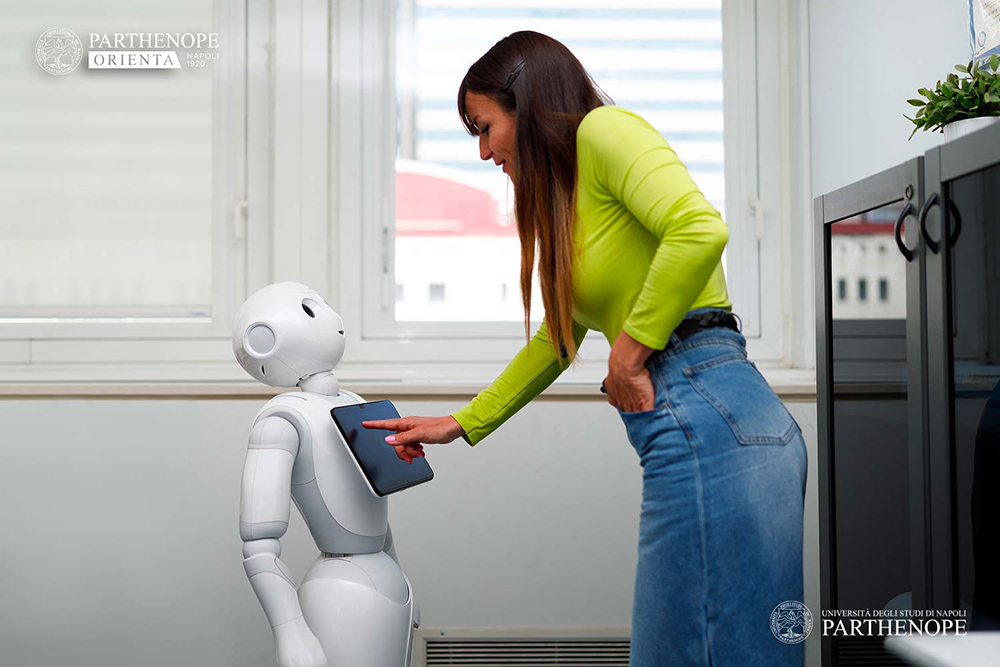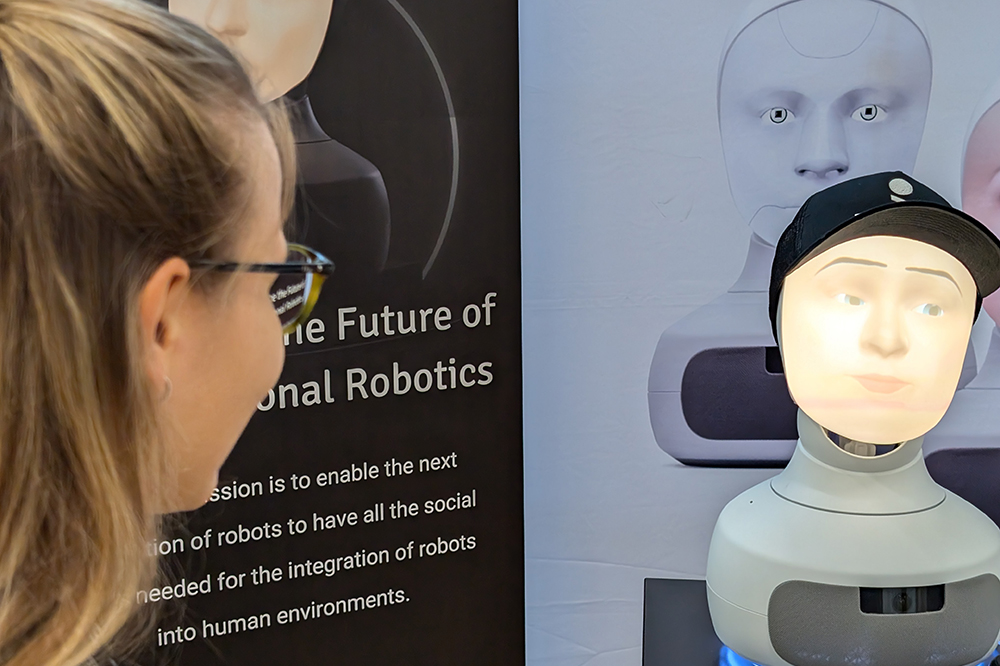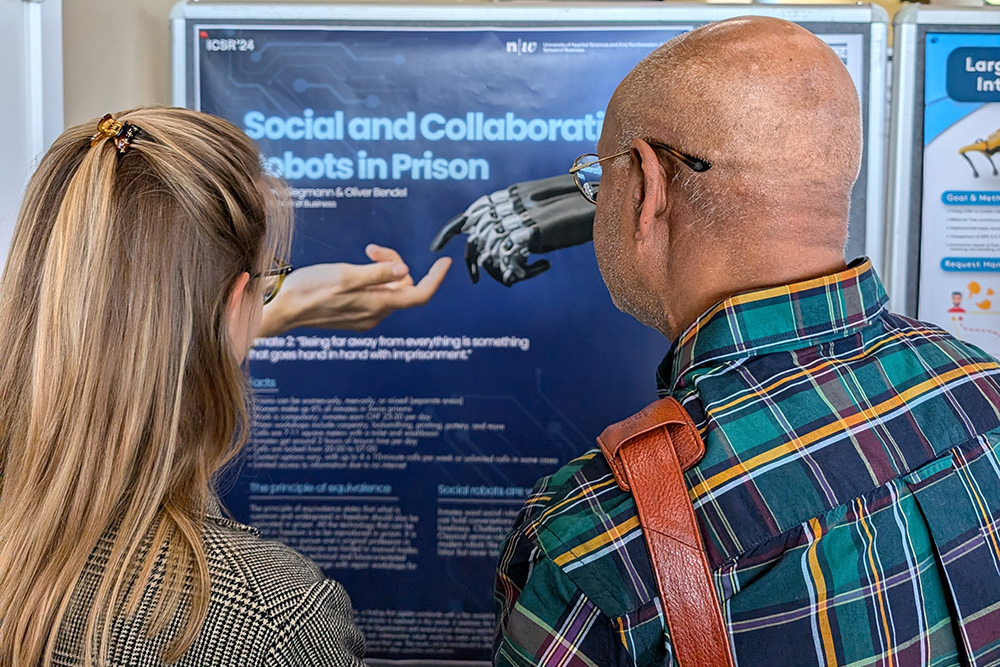Join us as a sponsor for the 17th International Conference on Social Robotics & AI, taking place on 10-12 September 2025 at Naples, Italy. This prestigious event brings together researchers, leading experts, innovators, and thought leaders in the fields of robotics, AI, and human-robot interaction. Don’t miss the opportunity to align your brand with cutting-edge advancements. We offer different sponsorship/exhibition packages, all information is available at the page: icsr2025.eu/sponsor2/. If you are interested or have any questions, don’t hesitate to contact us at info@icsr2025.eu with the subject line tag [Sponsorship]. The ICSR is one of the leading conferences for social robotics worldwide. Participants will meet for two days at the Parthenope University of Naples and for the third day at the Città della Scienza conference center. More information on icsr2025.eu.
Special Sessions at ICSR 2025
ICSR’25 allows for special sessions on topics of particular interest to attendees. The goal is to complement the regular program with new and emerging topics of interest in social robotics. Proposals will be evaluated on a rolling basis until the deadline below, and organizers will be notified of the outcome. Once accepted, the invited session will be published on the ICRS website along with an invited session code to be used at the time of paper submission. Special session papers will go through the same review process as regular papers and will be published in the same way. Papers should be submitted as PDF documents of no more than 3-4 pages. More information is available at icsr2025.eu/ss-ws-proposal/.
ICSR 2025 at the Parthenope University of Naples
The first two days of ICSR 2025 will be held “on the industrial side of Naples”. This has been announced by the General Chairs, Mariacarla Staffa (University of Naples Parthenope, Italy) and John-John Cabibihan (Qatar University, Qatar). The Honorary Chair is Bruno Siciliano (University of Naples Federico II, Italy). “The University of Naples Parthenope will host the social robotics conference and showcase the technological advancements of this innovative city. Since 1919, the University of Naples Parthenope has been dedicated to fostering young talent, offering internationally oriented education and cutting-edge research. With 15,000 students, 320 faculty, and 250 staff, it combines a strong maritime tradition with excellence in economics, law, engineering, technology, and sports sciences. Innovation and real-world impact are at the core of its mission.” (Announcement General Chairs) On the third day, the participants will meet at the Città della Scienza conference center. The conference website of ICSR 2025 is online since January: icsr2025.eu (Photo: Parthenope).
Interpersonal Distance Preferences in Human-Robot Interactions
The paper “Robots at arm’s length: Unveiling the dynamics of interpersonal distance preferences in human-robot interactions” by Katharina Kühne, Laura M. Zimmer, Melina Jeglinski-Mende, Oliver Bendel, Yuefang Zhou, and Martin H. Fischer was published in February 2025 in the proceedings volume “Social Robots with AI: Prospects, Risks, and Responsible Methods” … From the abstract: “In social interactions, interpersonal distance is a vital factor influencing relationships, providing protection, and regulating arousal. Despite the intuitive nature of adopting specific distances, little is known about comfortable interpersonal distances with social robots. In our online study with 66 participants using a Go/No-Go task, we investigated perceptions of individuals standing face-to-face with a robot at different distances. In line with the negativity bias hypothesis, participants exhibited a preference for greater distances , as reflected in longer reaction times. Furthermore, the human-likeness of the robots moderated the link between distance and arousal. Finally, the most human-like robot was less liked and evoked higher arousal. These findings have implications for designing social robots and optimizing interactions, particularly in educational or medical contexts.” The proceedings volume comprises the papers presented at Robophilosophy 2024 in Aarhus. Leading philosophers, computer scientists, and roboticists met there in August. Like the ICSR, the conference is one of the world’s leading conferences on social robotics.
A Video About the ICSR 2023
ICSR is one of the leading conferences for social robotics worldwide. The 17th edition will take place from 10 to 12 September 2025 in Naples, Italy. Participants will meet for two days at the Parthenope University of Naples and for the third day at the Città della Scienza conference center. In 2023, the conference took place in Doha, Qatar. A video on YouTube by Hooman Samani provides insights into the presentations and events: www.youtube.com/watch?v=MtgM8pTPw8c … It not only shows that numerous top-class presentations take place, but also that the members of the community are highly motivated and have a lot of fun. The high level of internationality and diversity of the conference should also be emphasized. The conference website of ICSR 2025 is online since January: icsr2025.eu.
A Video About the ICSR 2024
ICSR is one of the leading conferences for social robotics worldwide. The 17th edition will take place from 10 to 12 September 2025 in Naples, Italy. Participants will meet for two days at the Parthenope University of Naples and for the third day at the Città della Scienza conference center. In 2024, the conference took place in Odense, Denmark. A video on YouTube by Hooman Samani provides insights into the presentations and events: www.youtube.com/watch?v=Xj6p2yguYBk … It not only shows that numerous top-class presentations take place, but also that the members of the community are highly motivated and have a lot of fun. The high level of internationality and diversity of the conference should also be emphasized. The conference website of ICSR 2025 is online since January: icsr2025.eu.
Cute little AIBI
Prof. Dr. Oliver Bendel’s privately funded Social Robots Lab has been home to little AIBI since January 2025. It comes from the Chinese company LivingAI. Other robots and figures in the Social Robots Lab are Cupboo AI Robotic Pet aka Boo Boo, Unitree Go2, Alpha Mini, Cozmo, Vector, Furby, Tamagotchi, and Hugvie. HUGGIE was dismantled at the beginning of 2025 and given to a student project in which the robot laughs with a synthetic or natural voice. NAO and Pepper visit the lab and the elective module on social robots from time to time. AIBI has various sensors, a camera, and three microphones. It understands voice commands. For more complex questions, it connects to ChatGPT. The face consists of a display in which it can show animated eyes and animated scenes of all kinds. It stands on a platform that allows it to rotate 360 degrees. It can also turn its head freely. Similar to Cozmo, it emits numerous sounds and tries to attract the user’s attention in this and other ways. Thanks to its magnets, it can be attached to the fridge and other metal surfaces, as well as to an included necklace, transforming it into a wearable. It also transforms with accessories, for example into a cat. Robot enhancement is therefore included and supplied by the company.
The ICSR 2025 Website is Now Online
The ICSR is one of the leading conferences for social robotics worldwide. The 17th edition will take place from 10 to 12 September 2025 in Naples, Italy. The conference website is now online: icsr2025.eu. “The conference theme, ‘Emotivation at the Core: Empowering Social Robots to Inspire and Connect,’ highlights the essential role of ‘Emotivation’ in social robotics. Emotivation captures the synergy between emotion and motivation, where emotions trigger and sustain motivation during interactions. In social robotics, this concept is key to building trust, fostering empathy, and supporting decision-making by enabling robots to respond sensitively to human emotions, inspiring engagement and action.” (Website ICSR) The most important conferences dates are: Full Paper Submission: March 28th, 2025; Full Paper Notification: May 9th, 2025; Camera-ready: June 30th, 2025; Paper Presentation Days at ICSR’25: September 11th and 12th, 2025. All dates are also listed on the website. Participants will meet for two days at the Parthenope University of Naples and for the third day at the Città della Scienza conference center. All buildings and rooms are also listed on the website. Be part of this excellent conference (Photo: ICSR)!
Robots in Prison
On October 22, 2024, Tamara Siegmann and Prof. Dr. Oliver Bendel (School of Business FHNW) presented their project “Robots in Prison” at the ICSR in Odense (Denmark). They investigated whether collaborative and social robots can and should be used in prisons. One result was that modern industrial robots such as cobots and classic service robots such as transportation and cleaning robots hardly create any added value. Instead, they take work away from inmates. In contrast, social robots are conceivable and useful. They bring something to imprisonment that is common in freedom. And – an important point for resocialization – they can combat the loneliness of inmates. The International Conference on Social Robotics is the most important conference for social robotics alongside Robophilosophy. The paper “Social and Collaborative Robots in Prison” will be published in a proceedings volume by Springer at the end of the year.
Can and Should We Use Robots in Prisons?
Tamara Siegmann and Prof. Dr. Oliver Bendel carried out the “Robots in Prison” project in June and July 2024. The student, who is studying business administration at the FHNW School of Business, came up with the idea after taking an elective module on social robots with Oliver Bendel. In his paper “Love Dolls and Sex Robots in Unproven and Unexplored Fields of Application”, the philosopher of technology had already made a connection between robots and prisons, but had not systematically investigated this. They did this together with the help of expert interviews with the intercantonal commissioner for digitalization, several prison directors and employees as well as inmates. The result was the paper “Social and Collaborative Robots in Prison”, which was submitted to the ICSR 2024. The International Conference on Social Robotics is the most important conference for social robotics alongside Robophilosophy. The paper was accepted in September 2024 after a revision of the methods section, which was made more transparent and extensive and linked to a directory on GitHub. This year’s conference will take place in Odense (Denmark) from October 23 to 26. Last year it was held in Doha (Qatar) and the year before last in Florence (Italy).









